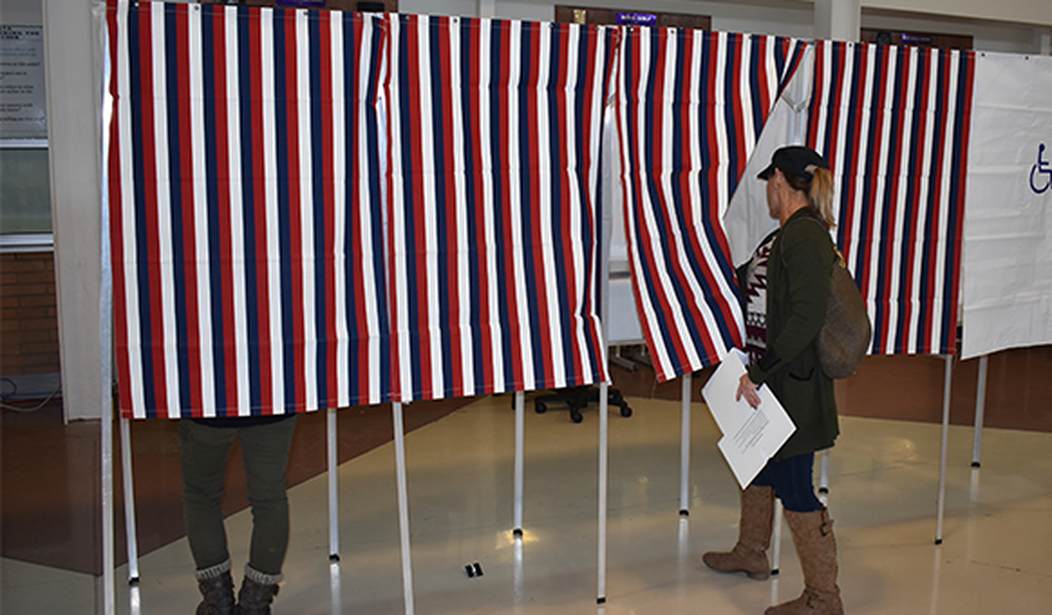Squad member Rep. Ayanna Pressley (D-Mass.) has been advocating for "incarcerated people" to be able to cast a ballot since she arrived in Congress. Indeed, there is a growing movement toward allowing felons to vote in non-federal elections. Some states already allow it.
At a Wednesday press conference, Pressley said, "That's why we're here today, to introduce the Inclusive Democracy Act — a historic, brand new, first-of-its-kind bill that will end the stain of felony disenfranchisement in America and guarantee the right to vote for incarcerated and formerly incarcerated citizens," Pressley said.
There are several reasons felons should be barred from voting, including the fact that voting is a privilege granted by society. Felonies against people or property make war on society, and a fit punishment is being unable to participate in the decision-making process. It's been that way for several thousand years in Greece and Rome and now the U.S.
The disenfranchisement of felons happened over the first 100 years of the republic as, one by one, individual states made it illegal for felons to vote.
Several Supreme Court cases in the last 50 years have confirmed a state's right to deny felons the vote. But since the turn of the 21st century, some states have either ended the practice of denying felons the vote or modified it. Pressley's bill would take the option away from states and see Washington impose its own rules on a felon's right to vote.
"Our bill is a reflection of bold, progressive, democratic values. Because of Republicans and the Supreme Court stopping at nothing to undermine voting rights and to exclude Black and brown folks from participating in our democracy, we must be just as relentless at protecting and expanding access to the ballot box, including for incarcerated citizens," she continued.
A 1985 Supreme Court ruling stated, "that states have the right to disenfranchise criminals but 'not with a racially discriminatory intent.'" Today, "discriminatory intent" means unequal outcomes. This opens the door for felons to be able to vote.
In late 2022, approximately 4.6 million people were unable to vote due to a felony conviction, according to a study by the Sentencing Project, a nonpartisan research group. The same study found that Black and Hispanic citizens are disproportionately likely to be disenfranchised due to felony convictions.
The "Squad" member pivoted to how "Jim Crow" is not "behind us" and spoke of her support for allowing individuals as young as 16 to vote.
I was 18 when the 26th Amendment, which lowered the voting age to 18, passed. The argument then was simple; if you're old enough to fight and die for your country, you should be given the right to vote.
Sixteen-year-olds are not stakeholders in American society. The overwhelming majority are wholly dependent on their parent or parents. That condition of dependence disqualifies them from having the right to vote. Plus, we've seen that the youth in America are manipulated far too easily to have the judgment or discernment to vote.
Universal suffrage for 16-year-olds reminds me of the 1968 dystopian film "Wild in the Streets," where a rock star endorses the effort to lower the voting age to 18. Discovering that his popularity has given him power, he advocates lowering the voting age to 14 and is elected president.
We don't have a test to see if a voter is informed enough to decide who would do the best job in office. Age is the only criterion we have to give the franchise to people with the judgment to act in our nation's interest.
Besides, if you're going to lower the voting age to 16, why not 15? Or 14? Let's leave "Wild in the Streets" as a movie and not try to create it in real life.










Join the conversation as a VIP Member